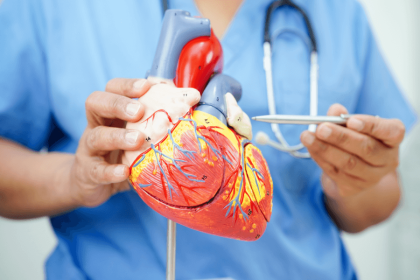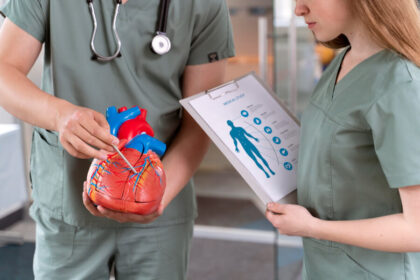High blood pressure, also known as hypertension, is a condition in which the force of blood against the artery walls is too high.
This can damage the arteries and lead to serious health problems, such as heart disease, stroke, and kidney disease.
As individuals age, their risk of developing high blood pressure increases, leading to potential complications and adverse health outcomes.
In this article, we will explore the relationship between high blood pressure and older people, highlighting the risks, potential causes, and effective management strategies.
Blood pressure is measured in two numbers: systolic and diastolic.
The systolic pressure is the pressure when the heart beats and pushes blood out into the arteries.
The diastolic pressure is the pressure when the heart rests between beats.
A normal blood pressure reading is less than 120/80 mmHg.
High blood pressure is diagnosed when the systolic blood pressure is at least 130 mmHg or the diastolic blood pressure is at least 80 mmHg on two separate occasions.
There are two types of high blood pressure: primary and secondary.
Primary high blood pressure is the most common type and has no known cause.
Secondary high blood pressure is caused by another medical condition, such as kidney disease, diabetes, or a narrowing of the arteries.
Understanding High Blood Pressure:
High blood pressure occurs when the force of blood against the walls of the arteries is consistently too high.
It is often referred to as the “silent killer” because it often presents no symptoms but can significantly contribute to serious health problems.
Age is a prominent risk factor for developing hypertension, and as adults grow older, their chances of hypertension-related complications, such as heart disease, stroke, kidney problems, and cognitive decline, also increase.
What causes high blood pressure in older adults?
Several factors can contribute to high blood pressure (hypertension) in older individuals. Here are some common causes:
Aging: As people age, their blood vessels become less elastic and more rigid, which can lead to increased blood pressure.
Genetics: Family history plays a significant role in developing high blood pressure. If your parents or close relatives had hypertension, you may be more prone to it.
Unhealthy lifestyle: Poor diet, lack of physical activity, excessive alcohol consumption, and smoking can all contribute to high blood pressure.
Weight gain: Being overweight or obese puts extra pressure on the blood vessels and increases the risk of hypertension.
Stress: Chronic stress can lead to high blood pressure over time.
Medications and health conditions: Certain medications, such as nonsteroidal anti-inflammatory drugs (NSAIDs) and some decongestants, can cause temporary spikes in blood pressure. Additionally, health conditions like kidney disease, thyroid disorders, and diabetes can contribute to hypertension.
Arterial stiffness: Arteries naturally become stiffer with age, which can raise blood pressure.
What are the risks for older adults?
High blood pressure, or hypertension, can pose significant risks for older adults. Here are some of the specific risks associated with high blood pressure in this population:
Cardiovascular diseases: Prolonged high blood pressure can damage and strain blood vessels, leading to an increased risk of cardiovascular diseases. These include conditions like heart attacks, heart failure, stroke, and peripheral artery disease.
Kidney disease: Chronic high blood pressure can damage the blood vessels in the kidneys, affecting their ability to function properly. This may lead to a condition called chronic kidney disease or even kidney failure.
Vision problems: Hypertension can impact the small blood vessels in the eyes, leading to a higher risk of retinopathy and vision loss.
Cognitive decline: Studies suggest a link between untreated high blood pressure and an increased risk of cognitive decline and dementia in older adults.
Aneurysms: Hypertension can weaken blood vessel walls, increasing the risk of developing aneurysms. An aneurysm is a bulge in the weakened section of an artery, which can rupture and cause a life-threatening situation.
Increased falls: Older adults may experience dizziness or lightheadedness due to medications or inadequate blood flow to the brain, leading to an increased risk of falls and injuries.
Complications during surgery: High blood pressure can complicate surgical procedures, as it increases the strain on the heart and blood vessels.
How is high blood pressure treated in older adults?
High blood pressure is often treated with lifestyle changes, such as losing weight, eating a healthy diet, exercising regularly, and limiting salt and alcohol intake. In some cases, medication may also be needed.
Medications for high blood pressure include:
Diuretics: Diuretics help the body get rid of excess salt and water, which can lower blood pressure.
Beta-blockers: Beta-blockers slow down the heart rate and reduce the force of the heart’s contractions, which can lower blood pressure.
ACE inhibitors: ACE inhibitors block an enzyme that causes blood vessels to narrow, which can lower blood pressure.
Angiotensin II receptor blockers (ARBs): ARBs work in a similar way to ACE inhibitors, but they block a different enzyme that causes blood vessels to narrow.
Calcium channel blockers: Calcium channel blockers relax blood vessels, which can lower blood pressure.
What can older adults do to manage their high blood pressure?
Older adults should work closely with their doctor to develop a treatment plan that is right for them. This may include lifestyle changes, medication, or both.
Here are some tips for older adults to manage it:
Eat a healthy diet: Eat plenty of fruits, vegetables, and whole grains. Limit your intake of salt, saturated and trans fats, and cholesterol.
Exercise regularly: Aim for at least 30 minutes of moderate-intensity exercise most days of the week.
Lose weight if you are overweight or obese: Even a small amount of weight loss can help to lower blood pressure.
Limit salt intake: Aim for no more than 2,300 milligrams of sodium per day.
Limit alcohol intake: Women should have no more than one drink per day and men should have no more than two drinks per day.
Take your medications as prescribed: If you are taking medication, it is important to take it as prescribed by your doctor.
Conclusion
In conclusion, high blood pressure among older individuals is a significant health concern that should not be ignored.
With the aging population, it is crucial to understand the risks and consequences of uncontrolled hypertension in this age group.
The prevalence of high blood pressure increases with age, and it is often associated with other chronic conditions and complications.
However, the good news is that high blood pressure can be managed and controlled through lifestyle modifications, medication, and regular monitoring.
By maintaining a healthy diet, engaging in regular physical activity, managing stress levels, and adhering to prescribed medications, older individuals can reduce their risks and improve their overall health.
Additionally, regular check-ups and communication with healthcare professionals are essential to monitor blood pressure levels, adjust treatment plans if necessary, and address any concerns.
With proper management, older individuals can successfully control their blood pressure and reduce their risk of related complications, improving their quality of life and longevity.
FAQs
What is considered high blood pressure in older adults?
In general, a blood pressure reading of 130/80 mmHg or higher is considered high for older adults.
However, it’s essential to consult with a healthcare professional to determine an individualized target range based on their overall health and medical history.
Are there any specific risk factors for developing high blood pressure as an older adult?
Yes, certain factors can increase the risk of developing high blood pressure in older age, including a family history of hypertension, sedentary lifestyle, poor diet (high in sodium and low in potassium), excess weight or obesity, smoking, and excessive alcohol consumption.
Can high blood pressure be managed without medication in older people?
Depending on the individual’s overall health and blood pressure levels, lifestyle modifications such as adopting a healthy diet (e.g., the DASH diet), exercising regularly, reducing sodium intake, maintaining a healthy weight, and managing stress can help control high blood pressure.
However, medication may also be necessary in some cases, as determined by a healthcare professional.
How does age impact the management of high blood pressure?
As individuals age, blood vessels naturally become less flexible and may contribute to higher blood pressure levels.
Additionally, older adults often have other health conditions and take multiple medications, which can complicate hypertension management.
Regular medical check-ups and medication adjustments may be necessary to manage blood pressure effectively.
Why is controlling high blood pressure important for older adults?
Uncontrolled hypertension among older people can significantly increase the risk of developing cardiovascular diseases, such as heart attacks, strokes, and heart failure.
By effectively managing blood pressure, older adults can reduce these risks and maintain better overall health, improving their quality of life.





